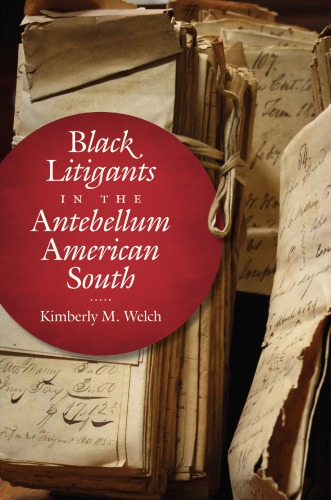Product desciption
Black Litigants In The Antebellum American South Kimberly M Welch by Kimberly M. Welch 9781469636450, 146963645X instant download after payment.
In the antebellum Natchez district, in the heart of slave country, black people sued white people in all-white courtrooms. They sued to enforce the terms of their contracts, recover unpaid debts, recuperate back wages, and claim damages for assault. They sued in conflicts over property and personal status. And they often won. Based on new research conducted in courthouse basements and storage sheds in rural Mississippi and Louisiana, Kimberly Welch draws on over 1,000 examples of free and enslaved black litigants who used the courts to protect their interests and reconfigure their place in a tense society.
To understand their success, Welch argues that we must understand the language that they used--the language of property, in particular--to make their claims recognizable and persuasive to others and to link their status as owner to the ideal of a free, autonomous citizen. In telling their stories, Welch reveals a previously unknown world of black legal activity, one that is consequential for understanding the long history of race, rights, and civic inclusion in America.
“Kimberly Welch has done a remarkable job piecing together a rich set of stories from these evasive texts and artifacts, bringing to life the world of ordinary people who were able to use the courts in extraordinary ways.” — Ariela Gross, author of What Blood Won’t Tell
“In this compelling, carefully researched book, Welch uses local court records to uncover the ways in which black litigants in the antebellum South advanced claims to legal personhood. The prevailing sanctity of private property created space within which they could seek loan repayment, wages due, inheritance, and sometimes even freedom, despite the fact that granting such claims to black litigants could undermine white supremacy. Written with a light touch and telling detail, this landmark study of race and law introduces us to men and women of African descent who took their white neighbors to court to assert rights they insisted should be respected.” -- Rebecca J. Scott, coauthor of Freedom Papers
“Black Litigants in the Antebellum American South challenges our understandings of the relationship between black people and the law in the antebellum South. Welch gives us a more complete picture of the black legal experience in civil--not criminal--litigation, where property rights precede and function as civil rights in the 1800s. Building on the strength of new approaches to the litigiousness and advocacy among peoples of African descent, Welch has written a deeply researched book that will engage scholars across the Americas.” -- Michelle McKinley, University of Oregon


